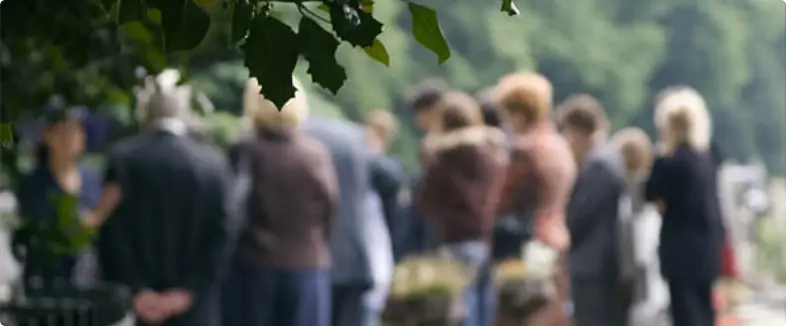There can be a lot of uncertainty in knowing what to do when someone passes away. Most people feel compelled to offer some kind of help, support, or words of encouragement for the family of the deceased, but they often aren’t sure the best way to approach the situation. You should know that it is normal and okay to feel this way.
We have compiled a list of the questions we most often receive regarding funeral etiquette for you below. We want you to feel comfortable and prepared for any services you attend.

Knowing what to say and being able to adequately express your sympathy can be difficult for some people. A good starting point is simply to offer your condolences to the family with a simple “I’m so sorry for your loss.” Depending on how well you knew the deceased, you may choose to share a fond memory or story about them. People often feel comfort from hearing about how their loved one positively impacted the lives of those around them.
For a traditional funeral or memorial service, you generally want to dress fairly conservatively and keep things simple. Muted colors like blues, grays, browns and black are always appropriate. A suit or jacket with a tie and dress shoes are usually suggested for men. Women typically wear a dress, suit or blouse with slacks. Try to keep any jewelry or accessories fairly simple and subtle.
The most important guideline regarding your arrival at a funeral or memorial service is to be on time. Try to arrive a few minutes early if possible to allow yourself enough time to locate a seat before the service begins. If there are users available, they will help direct you to the appropriate seating area. If not, the first few rows of seats are generally reserved for the immediate family and close friends of the deceased. If you happen to arrive late, please try to enter the room as quietly as possible to avoid distracting other attendees and select a seat near the back of the room.
If you are less familiar with the person who passed and their family, the most appropriate thing is to visit the family at the funeral home to offer your condolences. This ensures they will be prepared to receive visitors during their designated visitation time.
If you have a close relationship with the family or knew their loved one well, you may choose to visit the home to offer your support and express your sympathy. The days immediately following a death can be very overwhelming for a family, so try to offer as much assistance as possible. Simple tasks such as meal preparation, household chores, helping with child care if they have young children, or assisting with service details and preparations can be incredibly helpful.
Flowers are a traditional way to express your condolences and let the family know they are in your thoughts during their time of loss. Many people find comfort in a beautiful floral arrangement or live plant while they are grieving. You may choose to have flowers delivered directly to the home of the family or to the funeral home if you would like them to be present at any services.
Generally you want to avoid any comments that may minimize the loss or try to downplay the feelings of grief someone may be feeling. Comments made with good intentions may not always be well received. Things like “it’s for the best” or “they’re in a better place” may not provide the comfort you are hoping to convey. It is also considered inappropriate to ask about the cause of death or the situation surrounding the death unless the family brings it up first.
During a visitation, the family will typically form a line to briefly greet attendees and receive condolences. This can be a very emotional time so you should try to keep your conversation brief. You will have another opportunity to visit with the family more extensively after the service. Try to be aware of other people who may be waiting to greet the family or visit the deceased at the casket, and do not linger too long. It is appropriate to say a few nice words to the family and then take a moment or two at the casket to say goodbye or say a short prayer for the deceased.
You should turn off or silence any cell phones or other devices you bring to the service. Avoid checking social media or doing anything that may cause a distraction to other attendees. If you need to check a message or return a phone call, please quietly leave the room before doing so. .
Whether children attend a funeral or memorial service will depend on the age of the child and the relationship they had with the deceased. It can be important to allow a child a chance to say goodbye to a family member or loved one, however some children may not be ready. If you determine the child is old enough to understand what is happening and they want to attend, you should try to prepare them for what to expect and what they might see at the service.
It may be best to leave very young children with another care provider if they are unable to attend without causing a distraction or are too young to understand the situation.
Practical gifts like a meal or an act of service can be very appreciated during a family’s time of grief. Basic daily tasks can feel overwhelming during the early days following a death and people are very appreciative when you can take some of the burden off their shoulders.
For families with young children, it is incredibly helpful to offer to assist with things like childcare or transportation to and from school. You may also consider taking a small gift or keepsake to the children, like a book or stuffed animal to help with their healing process.
Do not be afraid to ask how you can help or what you can do. People may not always know how you can help them, so you may need to ask direct questions like “what night can I bring you dinner?” or “what can I pick up for you at the grocery store?”. Helping around the house, providing care for any pets and animals, running errands and assisting with other daily tasks the family may not be able to focus on right now can be a huge blessing for them.
Contact Us
We are available 24/7, 365 days a year. If you need our services immediately, please call us at (207) 324-4104

